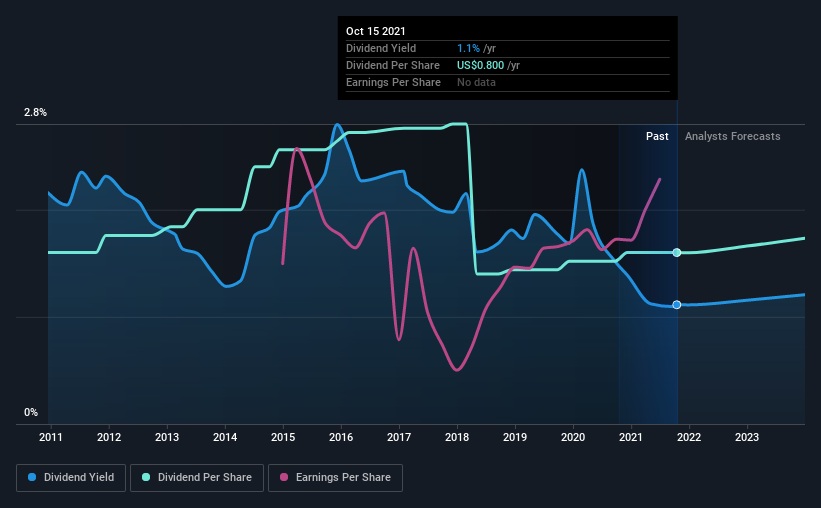Be Sure To Check Out Pentair plc (NYSE:PNR) Before It Goes Ex-Dividend
Pentair plc (NYSE:PNR) stock is about to trade ex-dividend in 4 days. The ex-dividend date is one business day before a company's record date, which is the date on which the company determines which shareholders are entitled to receive a dividend. The ex-dividend date is of consequence because whenever a stock is bought or sold, the trade takes at least two business day to settle. Meaning, you will need to purchase Pentair's shares before the 21st of October to receive the dividend, which will be paid on the 5th of November.
The company's next dividend payment will be US$0.20 per share, and in the last 12 months, the company paid a total of US$0.80 per share. Looking at the last 12 months of distributions, Pentair has a trailing yield of approximately 1.1% on its current stock price of $71.88. We love seeing companies pay a dividend, but it's also important to be sure that laying the golden eggs isn't going to kill our golden goose! We need to see whether the dividend is covered by earnings and if it's growing.
Check out our latest analysis for Pentair
Dividends are typically paid out of company income, so if a company pays out more than it earned, its dividend is usually at a higher risk of being cut. Fortunately Pentair's payout ratio is modest, at just 27% of profit. Yet cash flows are even more important than profits for assessing a dividend, so we need to see if the company generated enough cash to pay its distribution. It paid out 21% of its free cash flow as dividends last year, which is conservatively low.
It's positive to see that Pentair's dividend is covered by both profits and cash flow, since this is generally a sign that the dividend is sustainable, and a lower payout ratio usually suggests a greater margin of safety before the dividend gets cut.
Click here to see the company's payout ratio, plus analyst estimates of its future dividends.
Have Earnings And Dividends Been Growing?
Companies with consistently growing earnings per share generally make the best dividend stocks, as they usually find it easier to grow dividends per share. Investors love dividends, so if earnings fall and the dividend is reduced, expect a stock to be sold off heavily at the same time. This is why it's a relief to see Pentair earnings per share are up 5.4% per annum over the last five years. Management have been reinvested more than half of the company's earnings within the business, and the company has been able to grow earnings with this retained capital. We think this is generally an attractive combination, as dividends can grow through a combination of earnings growth and or a higher payout ratio over time.
The main way most investors will assess a company's dividend prospects is by checking the historical rate of dividend growth. Pentair's dividend payments are broadly unchanged compared to where they were 10 years ago.
To Sum It Up
Should investors buy Pentair for the upcoming dividend? Earnings per share growth has been growing somewhat, and Pentair is paying out less than half its earnings and cash flow as dividends. This is interesting for a few reasons, as it suggests management may be reinvesting heavily in the business, but it also provides room to increase the dividend in time. We would prefer to see earnings growing faster, but the best dividend stocks over the long term typically combine significant earnings per share growth with a low payout ratio, and Pentair is halfway there. It's a promising combination that should mark this company worthy of closer attention.
Ever wonder what the future holds for Pentair? See what the 16 analysts we track are forecasting, with this visualisation of its historical and future estimated earnings and cash flow
If you're in the market for dividend stocks, we recommend checking our list of top dividend stocks with a greater than 2% yield and an upcoming dividend.
This article by Simply Wall St is general in nature. We provide commentary based on historical data and analyst forecasts only using an unbiased methodology and our articles are not intended to be financial advice. It does not constitute a recommendation to buy or sell any stock, and does not take account of your objectives, or your financial situation. We aim to bring you long-term focused analysis driven by fundamental data. Note that our analysis may not factor in the latest price-sensitive company announcements or qualitative material. Simply Wall St has no position in any stocks mentioned.
Have feedback on this article? Concerned about the content? Get in touch with us directly. Alternatively, email editorial-team (at) simplywallst.com.

